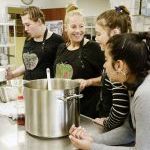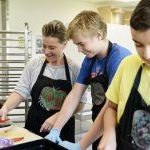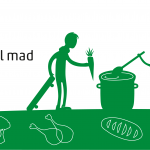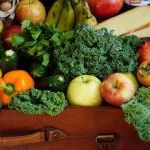LOMA - Local Food (Lokal Mad)
LOMA – Lokal Mad (Local food) is a concept that aims to integrate food in pupils’ school life. The first LOMA pilot project was developed and initiated at Nymarkskolen in Svendborg (2011-13). Ever since LOMA has been a part of the daily routines at the school. The pupils participate in planning, cooking and serving the food at the school. The LOMA concept has improved pupils’ food and health-related skills and helped pupils develop better food habits. Furthermore, the project engages in the development and implementation of sustainable procurement practices through the municipal food procurement systems. Since the start of the pilot project, several more schools have implemented ideas from the LOMA –concept (see more at lomaskole.dk)
Website
Useful links
Country
Media
Photo credits: Mengel
Useful UK links
The enterprising Bonhill Primary School in Dumbartonshire, Scotland have also enabled pupils to help the school cooks prepare lunches.
* TOP TIP *
'Arrange a meeting between the children and kitchen staff. Help them to carry out an audit of suppliers to see how far the food travels from field to table'
References
References to research where LOMA at Nymarkskolen is included:
Jones, M., Ruge, D., & Jones, V. (2022). How educational staff in European schools reform school food systems through ‘everyday practices’. Environmental Education Research, 1-15.
Ruge, D., Jones, M., Jones, V., & Puck, M. R. (2019). EPESS Evaluation report, Erasmus+ project.
Ruge, D. (2021). Student Creativity and Professional Artwork in a School Food Intervention in Denmark. In Arts and Health Promotion (pp. 53-66). Springer, Cham.
Shakeri, S., Ruge, D., Myers, J., Rolls, N., Papatraianou, L., & Fethney, J. (2021). Integration of Food and Nutrition Education Across the Secondary School Curriculum: Two Experiential Models as Two Case Studies. Journal of Education and Training Studies, 9(6).
Homepage for LOMA Association: www.lomaskole.dk
Homepage for Project LEARNFOOD Nordplus Horisontal.
How is the project linked to climate change and sustainability?
The LOMA approach provides the pupils with a better understanding of sustainable food habits. They are educated both theoretically and practically in the subjects; seasonal food, from soil to table, local food, healthy food, the futures sustainable food production etc. Furthermore, this local food concept has enhanced the development of an implementation of a sustainable municipal food procurement.
Who is involved?
The LOMA approach encompass works with schools (teachers, pupils and kitchen staff), municipality, food buyers and local food providers.
How are the partipants involved?
The LOMA project provides four core principles for the schools, who decidesthemselves how to carry them out in practice.
Principle 1: General education, community, well-being. At Nymarkskolen this is practiced through a daily meal where pupils and teachers eat together.
Principle 2: Learning and education. At Nymarkskolen pupils are involved in cooking, excursions and visits from guest teachers, such as local food producers, and in producing or gathering food.
Principle 3: Working together on learning with parents and other partners in the local community. This is practiced through inviting parents and other stakeholders to LOMA activities, e.g. annual events.
Principle 4: Food quality and material food environment. Nymarkskolen is guided by the Danish certificate ‘Måltidsmærket’ – The Meal Label.
Key steps:
The LOMA concept provides four core principles. Schools decide themselves how they want to carry them out in practice.
Principle 1: General education, community, well-being. At Nymarkskolen this is practiced through a daily meal where pupils and teachers eat together.
Principle 2: Learning and education. At Nymarkskolen, pupils are involved in cooking, excursions and visits from guest teachers, such as local food producers, and in producing or gathering food.
Principle 3: Working together on learning with parents and other partners in the local community. This is practiced as parents and other stakeholders are invited to participate in LOMA activities, e.g. annual events.
Principle 4: Food quality and the physical interior – production kitchen and dinner hall. The food must be healthy, reflect the season and be cooked from scratch. As far as possible, local produce is used, certified and at least 30% organic raw materials. The kitchen must be furnished with professional equipment in order to attract and retain professional labour, as well as provide opportunities for children and young people can participate in the production of the common meal.




